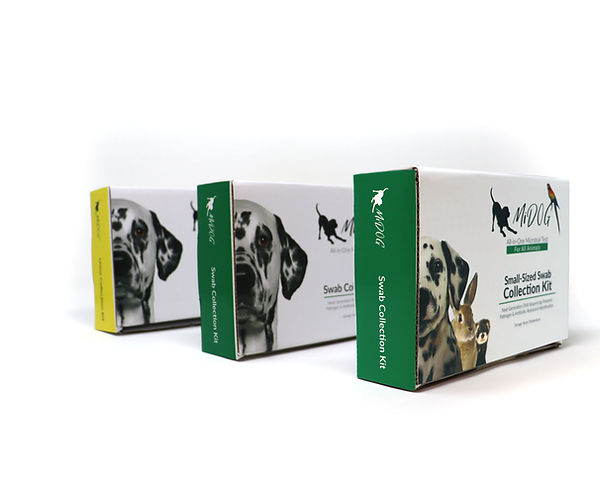
Next-Gen Sequencing can help diagnose infections in rabbits!
Did you know that approximately 30%-90% of seemingly healthy rabbits may be asymptomatic carriers of Pasteurella multocida [1]? This bacterium causes pasteurellosis, which commonly impacts not only the rabbit’s respiratory system, but can also localize in eyes, ears, skin, reproductive organs, and more [1]. While the symptoms of pasteurellosis are broad and may appear benign, visiting a veterinarian is crucial in preventing the disease from becoming chronic and difficult to control.
Symptoms of Pasteurellosis in Rabbits
P. multocida is a Gram-negative, non-motile coccobacillus that rabbits often become infected with soon after birth [2]. This pathogen is highly contagious and can be transmitted through both direct contact and through the air [1]. Moreover, the strain of P. multocida has a major impact on its virulence. Serogroups A and D strains of P. multocida are classically considered the key causative agents of rabbit pasteurellosis manifestation, although other serogroups are currently under investigation to reassess their pathogenicity [3,4,5].
The good news is that if the strain of P. multocida is one of the less virulent ones and the rabbit has a strong immune system, there is a chance that the rabbit may recover without treatment! That being said, that rabbit will likely become an asymptomatic carrier of P. multocida, which can potentially become symptomatic if this opportunistic bacterium is able to overwhelm commensal bacteria and the rabbit’s immune system [2]. The likelihood of this occurring increases under periods of stress, and so it is important for pet parents to monitor and correctly manage their rabbit’s habitat and diet [1].
If a rabbit is infected with an aggressive serogroup of P. multocida and/or the bunny has a weakened immune system, pasteurellosis can be very severe and in extreme cases can cause death. It is recommended to visit an exotic pet specialist to help diagnose the cause of your rabbit’s symptoms, and use targeted antibiotics in order to avoid chronic infections. Delay in care can complicate your rabbit’s infection, so seeking medical attention at the first sign of symptoms is crucial.
While bunny pasteurellosis severity exists on a spectrum and can impact several systems within the body, the following symptoms indicate that your rabbit may be suffering and needs to visit a veterinarian:
- Nasal discharge
- Sneezing
- Congestion
- Conjunctivitis
- Scalding of skin around eyes
- Abscesses under the skin
- Oscillations of the eye
- Severe tilting of the head
- Abnormal reproductive tract discharge
Reducing stress by maintaining good animal husbandry is key for preventing infections in rabbits.
Traditional Diagnosis of Pasteurellosis
The most common intervention for rabbit pasteurellosis is an antibiotic treatment plan, although treatment is notoriously difficult and often only results in remission. Additionally, with the significant increase in antibiotic-resistant strains of P. multocida, some treatments have become increasingly less effective [5]. Diagnosis is currently made through a combination of clinical signs, bacterial culture, and serotyping [2]. However, advancements in defining the rabbit microbiome, complicated by antibiotic resistance are making it necessary for veterinarians to consider contemporary measures to identify and quantify the bacteria, wherever the infection may be.
Particularly, treatment for subclinical pasteurellosis has become more clouded as recent research suggests that antimicrobial treatment may not have a lasting impact on patients [2]. Differentiating subclinical P. multocida infections from subclinical infections is consequently difficult but necessary if modern veterinary medicine aims to curb the over-prescription of antibiotics [6]. Although culture-based tests have historically been lauded as the standard to characterize the rabbit microbiome, scientific research has provided increasing evidence for the diagnostic benefits of Next-Gen Sequencing (NGS) technology. Conventional culture-based tests have significant limitations in sensitivity to various microorganisms, as many remain undetected by culture methods; P. multocida is no exception to this, and often produces “no growth” cultures.
New and Powerful Diagnostic Alternative
The MiDOG All-in-One microbiome test may provide the answer to the diagnostic conundrum that pasteurellosis poses on your rabbit. Utilizing next generation sequencing technology to detect and quantify all microbial DNA through untargeted and comprehensive sequencing and quantitative comparisons to reference databases, the MiDOG NGS technology provides a useful opportunity to shed light on the microbial makeup of your rabbit’s infection for clinical application. The MiDOG microbiome test is a microbial identification test grounded on scientific research that provides veterinarians DNA evidence for the guided treatment of rabbit infections, such as pasteurellosis.
Find out if your vet uses MiDOG before you book your next appointment!
References
[1] Salem, H. (2022). Rabbit Pasteurellosis. Retrieved from https://scholar.cu.edu.eg/hebasalem/files/rabbit_pasteurellosis_1.pdf
[2] Mayer, J. (2021). Bacterial and Mycotic Diseases of Rabbits – Exotic and Laboratory Animals – MSD Veterinary Manual. Retrieved from https://www.merckvetmanual.com/exotic-and-laboratory-animals/rabbits/bacterial-and-mycotic-diseases-of-rabbits#:~:text=Images%20(8)-,Pasteurellosis,age%20until%20about%205%20months.
[3] Jaglic, Z., Jeklova, E., Christensen, H., Leva, L., Register, K., & Kummer, V. et al. (2011). Host response in rabbits to infection with Pasteurella multocida serogroup F strains originating from fowl cholera. Can J Vet Res., 75(3), 200-208. Retrieved from https://www.ncbi.nlm.nih.gov/pmc/articles/PMC3122976/
[4] Frebourg, N., Berthelot, G., Hocq, R., Chibani, A., & Lemeland, J. (2002). Septicemia Due to <i>Pasteurella pneumotropica</i> : 16S rRNA Sequencing for Diagnosis Confirmation. Journal Of Clinical Microbiology, 40(2), 687-689. doi: 10.1128/jcm.40.2.687-689.2002
[5] Hu, J., Li, W., Huang, B., Zhao, Q., & Fan, X. (2021). The Profiles of Long Non-coding RNA and mRNA Transcriptome Reveals the Genes and Pathway Potentially Involved in Pasteurella multocida Infection of New Zealand Rabbits. Frontiers In Veterinary Science, 8. doi: 10.3389/fvets.2021.591273
[6] Palócz, O., Gál, J., Clayton, P. et al. Alternative treatment of serious and mild Pasteurella multocida infection in New Zealand White rabbits. BMC Vet Res 10, 276 (2014). https://doi.org/10.1186/s12917-014-0276-6


